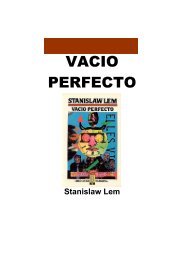cambridge-crime-fiction
cambridge-crime-fiction
cambridge-crime-fiction
Create successful ePaper yourself
Turn your PDF publications into a flip-book with our unique Google optimized e-Paper software.
The Newgate novel and sensation <strong>fiction</strong>, 1830–1868<br />
at the height of the Newgate controversy (and thus possibly a post hoc rationalisation<br />
and sanitisation of his aims in the light of the moral furore<br />
directed at Newgate <strong>fiction</strong>), Bulwer claimed that one of his objects in Paul<br />
Clifford had been ‘to draw attention to two errors in our penal institutions,<br />
viz., a vicious Prison-discipline and a sanguinary Criminal Code’. It should<br />
be remembered that Paul Clifford looks back to a time when there were over<br />
200 capital offences on the statute book, for <strong>crime</strong>s ranging from murder and<br />
highway robbery to sheep-stealing and impersonating a Chelsea Pensioner<br />
(an inmate of the Chelsea Royal Hospital for old or infirm soldiers), and<br />
when policing was haphazard and corrupt and prisons brutal and insanitary.<br />
It was published at a time when there had already been a twenty-year<br />
campaign for the reform of the criminal code and the prison system, and<br />
when Peel’s campaigns for police reform had begun to bear fruit with the<br />
establishment of the Metropolitan Police Office in 1829. Prison reform took<br />
rather longer: it was only in 1835 that the Prison Act established inspectors<br />
of prisons on the model of the factory inspectorate.<br />
Paul Clifford encourages its readers to ask, as Paul Clifford does of Lucy<br />
Brandon, ‘What is Crime?’ Paul’s answer suggests that <strong>crime</strong> is both a social<br />
construct and the product of inequitable social conditions:<br />
Men embody their worst prejudices, their most evil passions, in a heterogeneous<br />
and contradictory code; and whatever breaks this code they term a<br />
<strong>crime</strong>. When they make no distinction in the penalty – that is to say, in the<br />
estimation – awarded both to murder and to a petty theft imposed on the<br />
weak will by famine, we ask nothing else to convince us that they are ignorant<br />
of the very nature of guilt, and that they make up in ferocity for the want of<br />
wisdom. 10<br />
If Paul is the criminal-as-victim, he is also an eloquent spokesman for social<br />
and legal reform. Thus in the speech which he makes in his own defence<br />
(felons did not have the right to a defence counsel before 1836), he attacks<br />
the system that has made him and which is about to condemn him.<br />
Your laws are but of two classes; the one makes criminals, the other punishes<br />
them. I have suffered by the one – I am about to perish by the other. . . .<br />
Seven years ago I was sent to the house of correction for an offence which I<br />
did not commit; I went thither, a boy who had never infringed a single law –<br />
I came forth, in a few weeks, a man who was prepared to break all laws! . . .<br />
your legislation made me what I am! and it now destroys me, as it destroys<br />
thousands, for being what it made me! ...Let those whom the law protects<br />
consider it a protector; when did it ever protect me? When did it ever protect<br />
the poor man? The government of a state, the institutions of law, profess to<br />
provide for all those who ‘obey.’ Mark! A man hungers – do you feed him? He<br />
23



